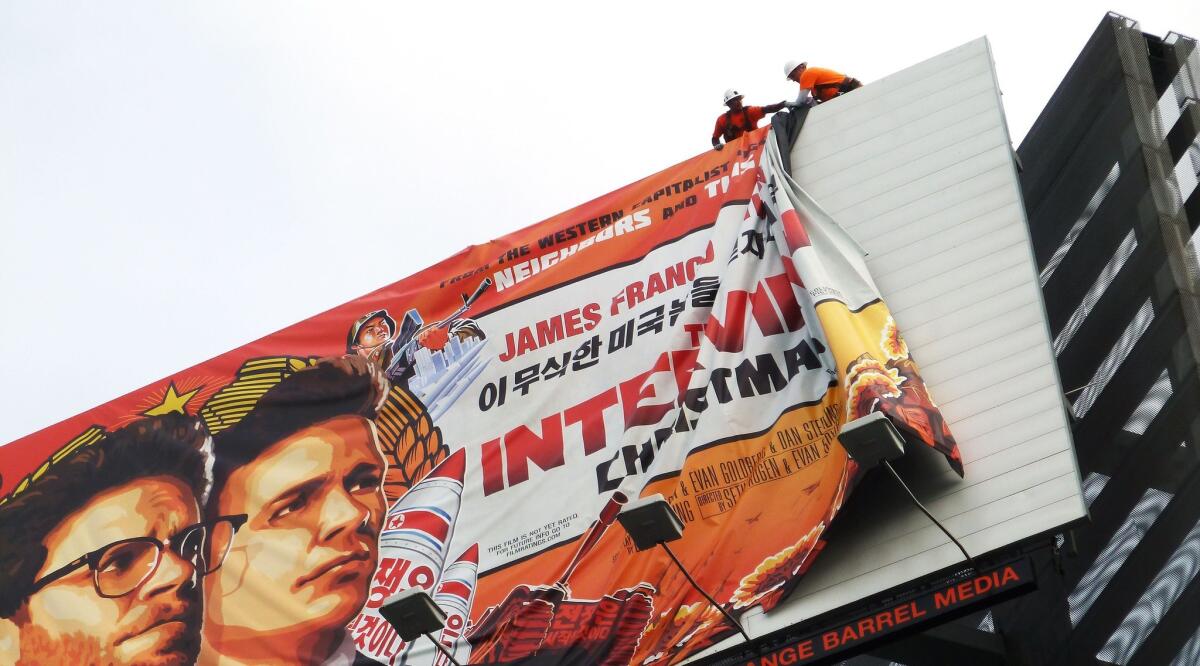Opinion: A former Sony executive responds: ‘This is not Sony’s fight to win’

- Share via
The L.A. Times’ editorial board expressed dismay Thursday at the fact that hackers had effectively censored Sony Pictures’ “The Interview” by threatening to attack theaters showing it. “The terrorists won this round,” the board wrote, urging Sony to release the film widely through online and pay-TV video-on-demand services.
The editorial writers at the Wall Street Journal were more sharp-tongued, as per their custom. “Capitulating to the threats of North Korea’s department of global propaganda -- and the U.S. government now believes Pyongyang was behind the Sony attack -- will not be remembered as a profile in Hollywood courage, and will set a precedent for further bullying of a notably weak-kneed industry,” they intoned.
The denunciations were echoed by actors, filmmakers and politicians, who blasted Sony for capitulating to crackpots.
That’s easy for us opinionistas to say, but such finger-wagging ignores the reality of the situation Sony found itself in, wrote Mitch Singer, the former Sony digital strategy officer who now leads the inter-industry group behind UltraViolet. Here’s a copy edited version of what Singer posted as a comment on The Times’ editorial and on Facebook:
“Headline: ‘Sony caves to terrorists.’ Really? ‘Sony should not have pulled the movie from theaters.’ Really? ‘Sony should release on VOD direct to home.’ Really? I’m surprised no one has suggested that Sony bomb North Korea. Sometimes, it’s smarter to save what you have and acknowledge that you lost this one. Pay the ransom and save your child. There are no distributors willing to take on the risk of a cyberattack -- for good reason. In this case, the terrorists actually won. But even if there were distributors, I would still advise Sony to pull the movie. Save what you have -- your child, your business. It’s easy to stand up for American values and the 1st Amendment when it’s not your child at risk.
“I have heard others say Sony should just release on a torrent and ask for a donation. Yeah, that will show them -- Sony doesn’t back down to terrorists. You tell ‘em Romney!! Even without distributors, Sony can still stand up for our 1st Amendment rights. Really? This is not Sony’s fight to win. Their fight is to save Sony Pictures. If they release [“The Interview”] on a torrent, more stolen confidential information will be released, running the risk of permanently damaging Sony Pictures.
“But let’s ask a more important question: Why do so many believe that this is Sony’s war to fight? Do we put the burden on families to hunt down kidnappers? (Only in movies). This was an attack on U.S. soil. What should the U.S. response be if we learn with a high level of certainty that North Korea was responsible? Should we sanction China for their economic support of North Korea? Should we take out North Korea’s nuclear capabilities with a targeted air strike? This was an attack on our values. What should the U.S. do -- if anything?”
Singer’s absolutely right that Sony, a Japanese corporation, owes its first duty to its shareholders and its employees. Making “The Interview” was a provocative act, which isn’t exactly a new chapter in the annals of filmmaking. But in this case, it provoked a group capable of doing something exceptionally destructive digitally.
Only Sony knows what else the hackers took that has yet to be released to the public. The company has to weigh the damage that could still be inflicted against the money it might gain by releasing the film. Another factor is whether putting “The Interview” into theaters in spite of the hackers’ threat would drive nervous consumers away from the multiplexes, hurting Sony’s other big holiday release, a remake of “Annie.”
Singer is also right that the larger 1st Amendment battle is “not Sony’s fight to win,” particularly if shelving “The Interview” allows the studio to reverse a decision that it has come to regret.
Nevertheless, by not putting the movie out, Sony has left the rest of us no way to fight that 1st Amendment battle either. As Singer notes, the U.S. government’s options aren’t very attractive. But the public could have responded to the hackers in a compelling and defiant way: by paying to watch the movie, which is exactly what the hackers are trying to stop us from doing.
I’m not saying this as a fan of “The Interview.” If I have to watch a harebrained film about an assassination attempt, I like it better when the killers fail, as in (spoiler alert!) “White House Down.” But once the self-titled Guardians of Peace put out that threat Tuesday, everything changed. It wasn’t just about Sony and one of its bromantic comedies any more; it was about everyone who goes to the movies. And as much as I resent the filmmakers for triggering an international incident over a throwaway piece of entertainment, I resent even more that someone would threaten me for daring to watch it.
Singer’s comment on The Times’ editorial drew this response from reader Mariscal:
“Why do so many believe that this is Sony’s war to fight?
“Because, Hollywood has as much interest in the first amendment as any other media making a buck from sales of critical parities, biting political cartoons or music with explicit lyrics. This is not just an attack on Sony, it’s an attack on our first amendment from a foreign source.
“How soon we forget that Hollywood has supported candidates and political campaigns when their interests are affected. If North Korea wants to ban this movie, or any movie, for that matter, they have that right. But, they don’t have the right to dictate what I can see or hear in my own country. If the movie gets pulled because it was lousy, that’s one thing. But, if it gets pulled because a motion picture studio was bullied and intimidated, in this country, by a country that has trouble feeding its own people, what does that say about other movies that other countries don’t like?
“Mitch, I hope your writers are reading these comments; it would make a terrific political suspense drama.
“However, which studio would have the testicular wherewithal to make it ... and show it?”
Judging from the criticism raining down on Sony, Mariscal and I are not the only ones who feel this way. Too bad Sony isn’t letting us fight that fight.
Follow Healey’s intermittent Twitter feed: @jcahealey
More to Read
A cure for the common opinion
Get thought-provoking perspectives with our weekly newsletter.
You may occasionally receive promotional content from the Los Angeles Times.











